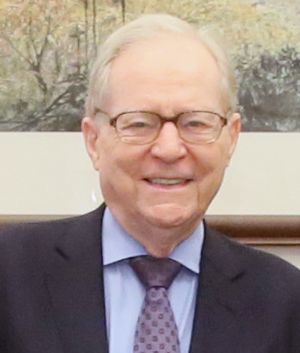Dale W. Jorgenson facts for kids
Quick facts for kids
Dale W. Jorgenson
|
|
|---|---|

Jorgenson in 2015
|
|
| Born | May 7, 1933 Bozeman, Montana, U.S.
|
| Died | June 8, 2022 (aged 89) Cambridge, Massachusetts, U.S.
|
| Nationality | American |
| Institution | Harvard University Department of Economics |
| Field | Economic theory, information technology and economic growth, energy and the environment, tax policy and investment behavior, and applied econometrics |
| Alma mater | Harvard University (Ph.D., 1959) Reed College (B.A., 1955) |
| Doctoral advisor |
Wassily Leontief |
| Doctoral students |
Robert Lucas Jr. M. Ishaq Nadiri</ref> Lawrence Lau Ajit Singh Fumio Hayashi Charles Horioka William Perraudin |
| Awards | John Bates Clark Medal (1971) |
| Information at IDEAS / RePEc | |
Dale Weldeau Jorgenson (born May 7, 1933 – died June 8, 2022) was a very important professor at Harvard University. He taught about economics and government. He also led the economics department at Harvard for several years.
Awards and Important Groups
Dale Jorgenson was recognized by many important groups for his work.
Prestigious Memberships
He became a member of the American Philosophical Society in 1998. He also joined the Royal Swedish Academy of Sciences in 1989. In the U.S., he was part of the National Academy of Sciences starting in 1978. He also joined the American Academy of Arts and Sciences in 1969. These are all highly respected groups for smart people.
Special Honors and Awards
Jorgenson was made a Fellow of the American Association for the Advancement of Science in 1982. He also became a Fellow of the American Statistical Association in 1965. In 1964, he became a Fellow of the Econometric Society. Being a "Fellow" means you are a top expert in your field.
Many universities around the world gave him special "honorary doctorates." This means they recognized his great achievements, even if he didn't study there. Some of these universities include Uppsala University, the University of Oslo, and Keio University.
Leadership Roles
Jorgenson was the president of the American Economic Association in 2000. This is a big group for economists in America. He was also a founding member of a board that looked at science, technology, and the economy for the United States National Research Council. He led this board from 1998 to 2006. He also led the Economic Sciences section of the National Academy of Sciences.
John Bates Clark Medal
In 1971, Jorgenson won the famous John Bates Clark Medal. This award is given to a top economist under 40 years old who has made amazing contributions to the field. It's like a special prize for young, brilliant economists.
Ideas on Taxes and the Environment
Jorgenson believed in using a carbon tax to help reduce global warming. A carbon tax is a fee on things that create greenhouse gas emissions, like burning fossil fuels. He spoke to the U.S. Congress about this idea in 1997.
His research also supported a tax plan called the FairTax. This idea was to replace all federal income and payroll taxes with a national sales tax. This means you would pay tax when you buy things, instead of on your paycheck. However, Jorgenson had his own tax plan called "Efficient Taxation of Income." This plan suggested different tax rates for money earned from work versus money earned from investments.
Key Research Areas
Jorgenson's work focused on how economies grow and how businesses make decisions.
Understanding Business Investment
In 1963, Jorgenson wrote an important paper called "Capital Theory and Investment Behavior." This paper explained how businesses decide to invest in new equipment or buildings. He showed how the cost of capital (like machines) and taxes affect these decisions. He also looked at how long it takes for investments to start working. This research helped him win the John Bates Clark Medal.
Investment Drives Growth
Jorgenson and his team studied how the U.S. economy grew. In their 2005 book, Information Technology and the American Growth Resurgence, they found something important. They showed that most of the U.S. economic growth (over 80%) came from investments. These investments were in things like new technology and better-trained workers. Only a smaller part of growth came from other factors. He found similar results for the world economy.
New Ways to Measure the Economy
Jorgenson helped create a new way to measure a country's economy. This new system includes the cost of all assets, even things like computer software. The United Nations recommended his ideas for how countries should track their economic numbers. This helps countries better understand their wealth and growth.
The World KLEMS Project
Jorgenson started the World KLEMS Initiative. This project collects detailed information about different industries in many countries. It looks at how much capital (K), labor (L), energy (E), materials (M), and services (S) are used. This helps economists compare how different countries and industries grow. Many countries now use this method in their official economic reports.
Measuring Well-being
Jorgenson also worked on ways to measure people's well-being or "welfare." He developed methods to compare how well different people or households are doing. This helps understand things like the cost of living, inequality, and poverty.
Evaluating Policies
Jorgenson created models to study how different government policies affect the economy. For example, he looked at how energy, environmental, trade, and tax policies impact people and businesses. This helps governments make better decisions that lead to economic growth and improve people's lives. His methods were even used by the U.S. Environmental Protection Agency.
Death
Dale Jorgenson passed away on June 8, 2022, in Cambridge, Massachusetts. He had been sick with breathing problems.
See also
 In Spanish: Dale W. Jorgenson para niños
In Spanish: Dale W. Jorgenson para niños
 | James Van Der Zee |
 | Alma Thomas |
 | Ellis Wilson |
 | Margaret Taylor-Burroughs |

